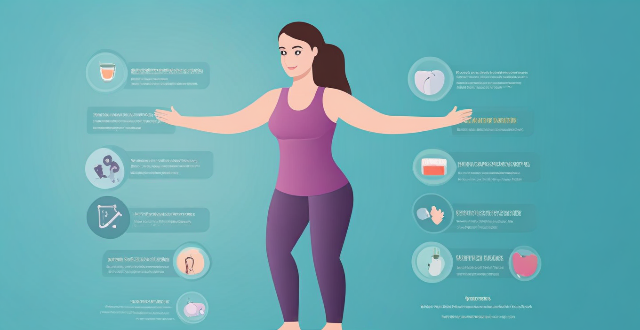Pain Pregnancy

Can exercise help reduce common pregnancy discomforts like back pain and swelling ?
Exercise can help alleviate common pregnancy discomforts like back pain and swelling by strengthening core muscles, improving posture, enhancing flexibility, promoting circulation, and reducing fluid retention. However, it's important to consult with a healthcare provider before starting any exercise program during pregnancy and follow safety precautions such as starting slowly, avoiding high-impact activities, staying hydrated, and listening to your body.

Is it safe to start a new exercise program during pregnancy ?
Is it safe to start a new exercise program during pregnancy? This article explores the topic, highlighting health benefits and potential risks. It emphasizes consulting with healthcare providers, choosing appropriate exercises, and monitoring body responses for safety.

Can I continue my regular workout routine during pregnancy ?
During pregnancy, it is important to maintain a healthy lifestyle, including regular exercise. However, consulting with your healthcare provider before continuing any workout routine during pregnancy is crucial. Regular exercise can improve cardiovascular health, reduce the risk of gestational diabetes, and alleviate symptoms of depression and anxiety. It can also help control weight gain during pregnancy and make it easier to lose the baby weight after delivery. Low-impact cardio exercises, strength training, and flexibility exercises are safe options for pregnant women. It is essential to listen to your body, avoid high-risk activities, and stay hydrated and nourished. Seeking professional advice is crucial for first-time pregnancies, multiple gestation pregnancies, and pregnancies with complications. Continuing a regular workout routine during pregnancy can be beneficial for both you and your baby, but making necessary modifications to ensure safety and well-being is essential.

How can women improve their nutrition during pregnancy ?
During pregnancy, women need to consume a balanced diet that includes protein-rich foods, complex carbohydrates, healthy fats, vitamins, and minerals. They should avoid certain foods and substances like raw meats, unpasteurized milk, alcohol, and tobacco products. Staying hydrated and getting enough exercise is also important for maintaining good health during pregnancy.

What are the best foods to eat during pregnancy ?
During pregnancy, it is important to consume a balanced diet that provides all the necessary nutrients for both mother and baby. Some of the best foods to eat during pregnancy include fruits, vegetables, protein sources, whole grains, dairy products, iron-rich foods, omega-3 fatty acids, and water. It is also important to avoid certain foods and limit caffeine intake.

How can I modify my workout routine to accommodate my changing body during pregnancy ?
As a fitness enthusiast, it's important to adapt your workout routine as your body changes during pregnancy. Start with low-impact exercises like walking or swimming and gradually increase intensity over time. Focus on strength training and avoid high-impact activities like running or jumping. Listen to your body and adjust your workout routine accordingly. Hire a personal trainer if needed to create a customized workout routine that meets your needs and accommodates your changing body during pregnancy.

What types of exercises are safe for pregnant women ?
Exercise during pregnancy can be beneficial, but it'Exercise during pregnancy can be beneficial, but it' right type of exercises that are but it's important to choose the right type of exercises that are safe and effective. Here are some exercise options that pregnant women can consider: 1. **Cardiovascular Exercises** such as walking, swimming, stationary cycling, elliptical training, and low-impact aerobics. 2. **Strength Training** exercises like bodyweight exercises, resistance band exercises, and dumbbell exercises using light weights. 3. **Flexibility and Balance Exercises** including yoga (prenatal classes recommended), Pilates (modified for pregnancy), Tai Chi, and stretching exercises. It's crucial to consult with a healthcare provider before starting any exercise program, listen to your body, stay hydrated, avoid overheating, and steer clear of activities with a risk of falling or abdominal trauma.

What precautions should I take when exercising during pregnancy ?
Exercising during pregnancy is a great way to stay healthy and prepare for childbirth, but it's important to take precautions to ensure the safety of both you and your baby. Here are some tips: 1. Consult with your doctor before starting any exercise routine. 2. Start low and go slow, gradually increasing your intensity as your body gets stronger. 3. Pay attention to your body and stop exercising if you feel tired, uncomfortable, or in pain. 4. Drink plenty of water before, during, and after your workout. 5. Avoid exercising in hot environments or at high altitudes. 6. Use proper equipment that is adjusted for your height and weight and doesn't put pressure on your abdomen or pelvis. 7. Don't overdo it and take breaks when needed. 8. Get enough rest between workouts so that your body has time to recover fully. 9. Join a prenatal fitness class specifically designed for pregnant women. 10. Be prepared for emergencies by carrying emergency contact information with you and knowing how to respond in case of an emergency situation while exercising.

Is it true that exercise can help manage chronic pain conditions ?
Exercise can help manage chronic pain conditions by reducing pain intensity, improving physical function, enhancing quality of life, and increasing energy levels. It is important to consult with a healthcare professional before starting any exercise program and to start slowly, gradually increasing intensity over time while listening to your body's responses.

What should I do if I experience pain during exercise ?
Pain during exercise can be a sign of injury or overexertion. To prevent and manage pain, it is important to warm-up properly, stretch regularly, pay attention to your body's signals, incorporate cross-training, take breaks, drink plenty of water, use proper form, rest and recover, and seek medical advice if necessary. By following these steps, you can reduce the risk of injury and improve your overall fitness.

What are the benefits of exercising during pregnancy ?
Exercising during pregnancy can improve physical fitness, reduce complications, enhance sleep quality, aid in faster recovery after childbirth, boost mood, lower depression risk, and improve cardiovascular health.